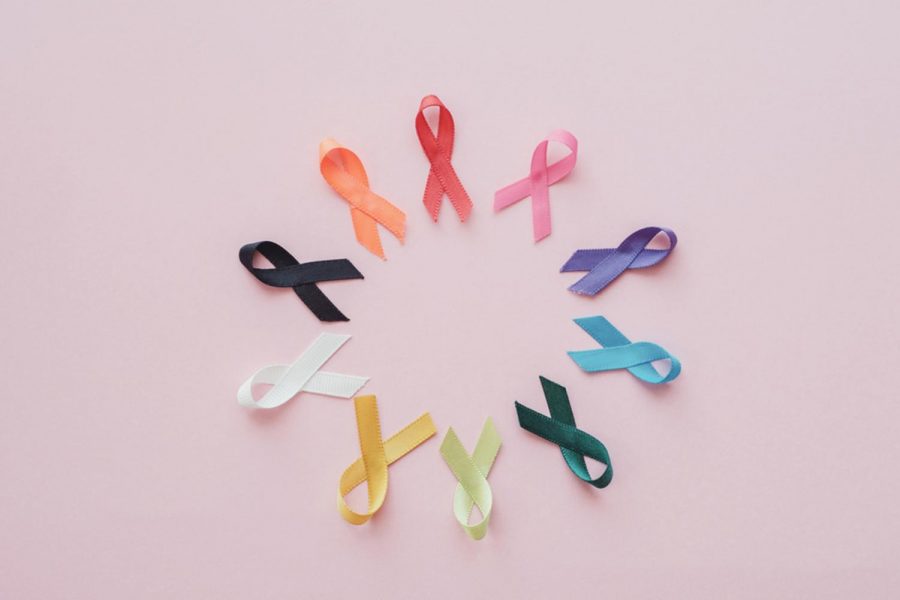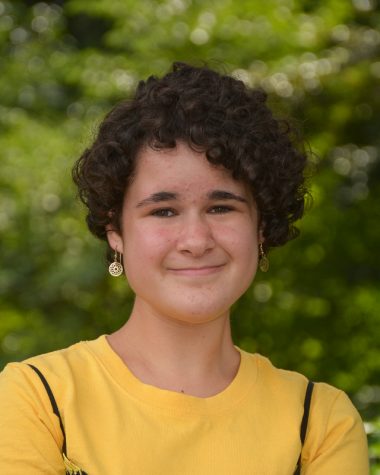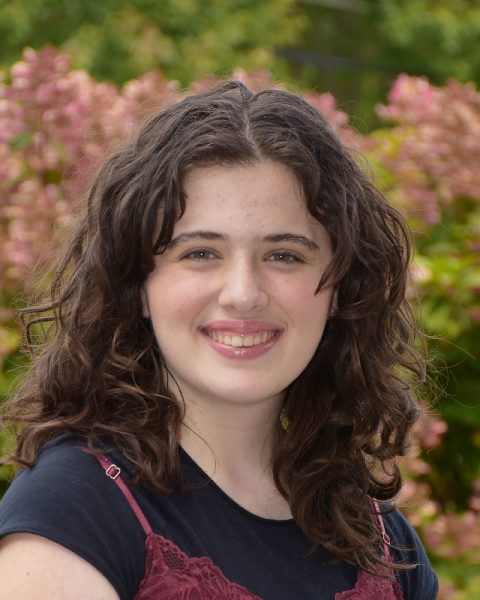Op-Ed: My Diagnosis, Five Years Later
Colorful ribbons on pink background, cancer awareness. Photo illustration purchased from BigStock.com.
May 4, 2020
Five years. May 8, 2020, will mark five years since the day I was diagnosed with an optic pathway glioma, or put more simply, brain cancer.
I’ve gone through hard times, including three surgeries on my brain, two others, and 14 months of chemotherapy, but by far the hardest part was after the fact—when I realized how many traumatic memories I gained from the experience.
I’ve never considered myself unlucky, before or after my diagnosis, but now I never take the little things in life for granted. Before being diagnosed, I struggled with a generalized anxiety disorder. I felt anxious all the time with random things trigger my emotions.
Surprisingly, my diagnosis helped me work through some of these struggles. At first, I felt totally overwhelmed with all of the surgeries and treatments, but I gradually realized my inner strength.
I had spent years worrying too much about homework and tests. My ordeal would teach me that mental and physical health should always come before school.
At first, even though I was exhausted from chemotherapy, I felt like I had to do keep up with my schoolwork. My teachers felt differently and were understanding about my situation, as I put a lot of unnecessary pressure on myself.
Something changed after months of trying my hardest to do everything, while also missing two days of school each week for treatments and falling asleep around six every night. I just couldn’t do everything anymore. I started to do less work, and I became less anxious about getting everything done.
Now, I’ve always prided myself for my love of learning and by no means was I just trying to get out of doing work, but I started to pick and choose the most important tasks to complete. This worked throughout the year, and I started to feel better in a lot of ways.
When I finally finished chemo in August 2016, I felt tired but strong. I quickly learned that even though I thought I had completed my journey, I was far from being finished. I was suddenly aware of the whirlwind that had become my life for the past year-and-a-half.
I struggled, and I often felt like I was still stuck in the same place as when I was sick. My friends didn’t get it, no matter how hard they tried, and that hurt. I felt like I was surrounded by memories from my treatment and I didn’t know how to act like a “normal” teenager.
I had also lost my hair from treatment which had never bothered me before, but I was suddenly aware of it as I walked down the hallways with my patchy, thin, brown hair just starting to grow back. I had never noticed how important beauty standards were to teenage girls until that moment, and I was especially hurt when I heard a group of girls complaining about how bad their hair looked that day.
I never said anything, though. I didn’t want to be the pathetic victim who was upset by everything.
Things started to get better when I started high school. Many of my middle school peers left and new kids came. Half of my grade didn’t know me, and I didn’t owe any of them an explanation about my past. It was my choice if I wanted to share my story, whereas in middle school, it was harder for me to maintain the same privacy.
Every year that passes means that I have been healthy for a longer time. This August will mark four years since I finished chemo, and it makes me feel better the farther away I get from it. I will always have to deal with knowing I have a brain tumor, but now, I am not as worried about it.
I think the breaking point for me was my diagnosis. I learned life can change in an instant, and worrying about every possibility doesn’t help—it drives one crazy.
I will always have anxiety, but every day I am learning how to manage it better. My past has made me stronger, and when I feel weak, I try to remember that I have been through harder situations.
I encourage anyone who is struggling with anxiety or mental health problems to talk about it and learn strategies to help manage it. It isn’t always easy, but it’s worth it in the end.
























































Professor Mandal • Oct 13, 2022 at 9:39 am
Zoe, thank you so much for sharing your beautiful writing. You are such an inspiration. Your kindness to everyone around you is absolutely beautiful. May you always be healthy and happy!
Janet Sweezey • May 7, 2020 at 4:35 pm
You’re AWESOME, Zoe.
Patti Reiser • May 7, 2020 at 11:03 am
Zoe,
After reading Op-Ed, I feel like you gave all of us lucky enough to know you, a glimpse of your heart and soul.
Your journey from fear to strength is so truthfully expressed. I hope tons and tons of people read this as they will be so inspired by your words.
You are a strong, and honest young lady. Hope you are as proud of yourself as we all are proud of you.
Jodi Blankstein • May 7, 2020 at 6:47 am
Zoe, your words are an inspiration… as are you!!!
I am so moved by your message of strength and hope. You are extraordinary.
Much love.
Jodi Blankstein.
Susan Glickman • May 6, 2020 at 9:00 am
Thank you for speaking YOUR mind and opening your soul to the world. Your experience is so personal yet speaks to so many universalities and truths. We have have so much to learn from you.!
Thank you for being you! Thank you for being real!
(Cantor). Susan
Lisa Kantor • May 5, 2020 at 9:19 pm
What a powerful and honest op-Ed, Zoe.
Thank you for your courage, sharing your experience is such a meaningful way to heal while also helping others. Love you!!
Auntie Lisa
Adam Chase • May 5, 2020 at 8:08 pm
Zoe, you are terrific and an outstanding person. Whatever you do, big or small is awesome and your story inspires all of us!